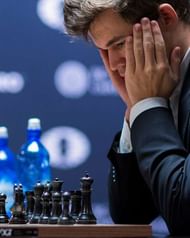For close to three weeks, Sergey Karjakin took on Magnus Carlsen in a sound proof, glass-boxed room in Lower Manhattan and by the end of the duel; almost came out victorious. In face of the immense challenge, the ‘challenger’ more than held his own against the reigning champion and frustrated him to such end, that Carlsen was the first to buckle, losing the 7th game trying to make too much out of a drawn position.
That he won the 10th game to draw level before ultimately turning it around in the tie-breakers is to Carlsen’s credit but as an amateur following the game from a distance; my lasting memory of the championship was the grace of Sergey Karjakin. He started the tournament with a smile and ended it with another.
Classical Chess is tough, an average game lasting for about 5 hours and sucking the juices out of your brain. To try to put it into perspective, it is equivalent to a management aspirant attempting two GMAT tests on the bounce; and then coming out to analyse his scores in depth.
It is no wonder then, that a player emerging from such a high-pressure duel usually comes out fidgety, can get easily irritated and is not in the mood for questions. It was therefore that Karjakin’s easy, disarming demeanour stood out.
He was polite, taking on almost all questions and answering them to his best abilities despite a stutter that was evident in his English, being witty when he could and doing all that with a permanent smile on his face.
Karjakin was, in fact, the only one of the two who showed a willingness to analyse games at length during post-game press conferences, with Carlsen mostly sticking to one-word responses. Carlsen was the favourite to start with, and so the pressure was on him to break through Karjakin’s defences.
Carlsen pushed to the brink
When he lost the 7th game, he seemed to completely lose the plot – walking away abruptly and with a distinct lack of grace before the conference began - and at that point, it was hard to see him come back into the match.
As the games threatened to run out, Carlsen finally drew level in the 10th, with Karjakin inexplicably missing a drawing opportunity with a knight check in the middle-game and letting the champion in through the back door with just two games left to play.
The win seemed to calm Carlsen’s nerves a bit, and after an uneventful draw with White pieces in the 12th and final game, Carlsen took the match into the tie-breaks; where he was decisively the better player.
Blitz makes the difference
A far better player at Blitz Chess – where you do not have enough time to examine all possible contours of the board, and have to rely more on instincts than preparation – Carlsen was once again in the driver’s seat.
Over four games of the blitz, Karjakin managed one final escape in the 2nd, to draw the game from a vastly inferior position. In the third, time pressure finally caught up with him, drawing a blunder too many, leaving him with the final game with black pieces to fight for a forced win.
He went for the Sicilian, kept the game open and even played a few sub-optimal moves to lure Carlsen to play for a victory and maybe just, sneak in through the back door himself. But with the challenger’s defences looking creaky and with time running out once again, it was Magnus Carlsen who seized the moment. Sensing a chance to finish the match and retain the Championship in style, Carlsen sacrificed his Queen, setting up a brilliant mating web and finally knocking his opponent down on the turf.
He had retained the championship on his birthday, but perhaps it was something else that gave him more joy than this.
“I’m very happy that at the end of the match I managed to find joy in playing,” Carlsen said. “Today, it was fun to play.”
Towards the end of a long tournament and when it mattered the most, he was finally able to shake off the weight on his shoulders and bring his natural aggression to the fore. Karjakin, deprived of all colour and slumped in his chair at the press conference, managed rare grace on his part and when called upon to say something, replied with, ‘Happy Birthday, Magnus.’
At a time when public appearances end up being sources of frustration and anger seems to come easily to most athletes, Sergey Karjakin displayed the head for a crunch battle and the heart of a champion. His supporters would be disappointed by the result but not before they enjoyed what was a finely contested, if only with just two decisive classical games, World Championship Match.


